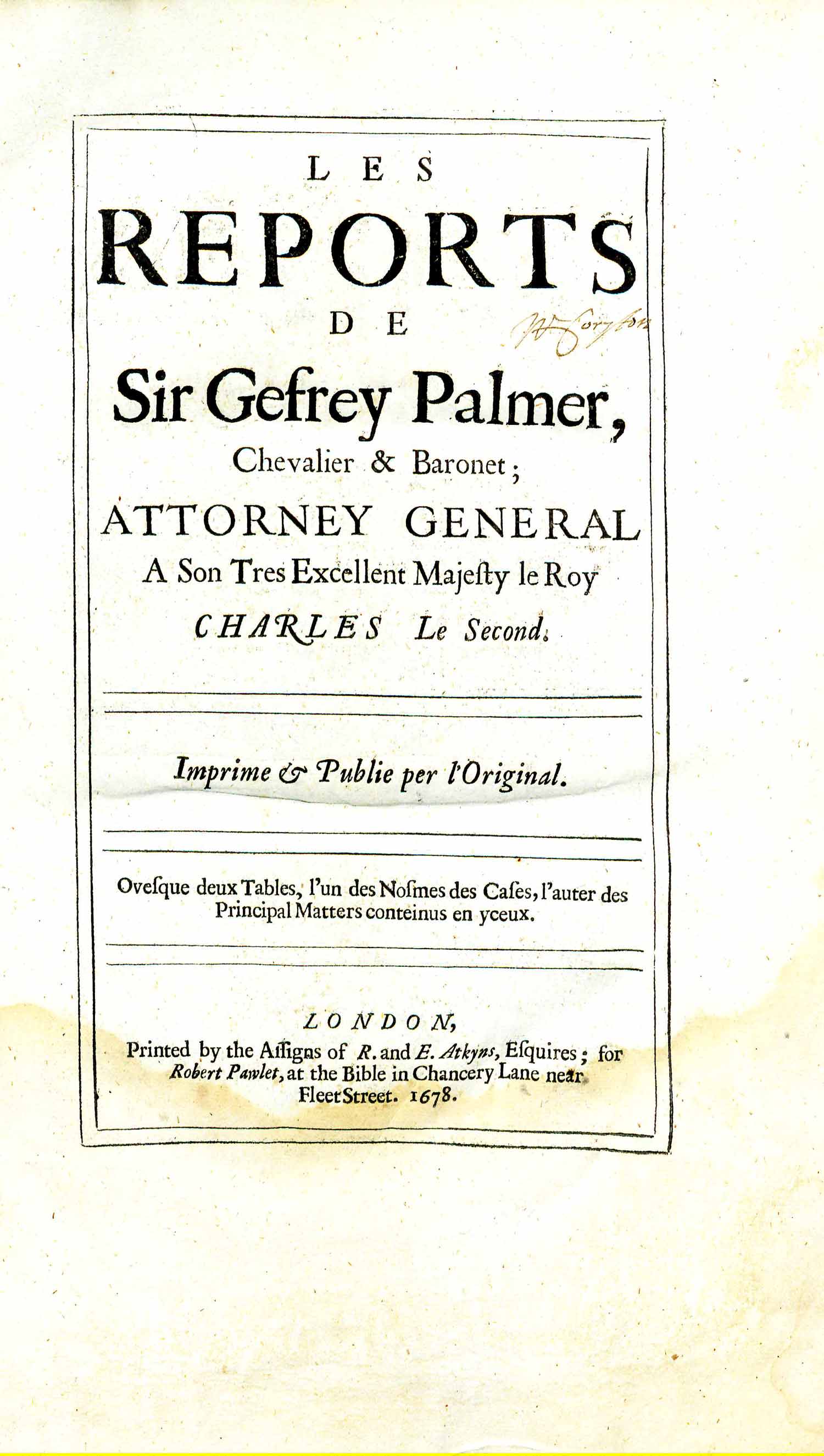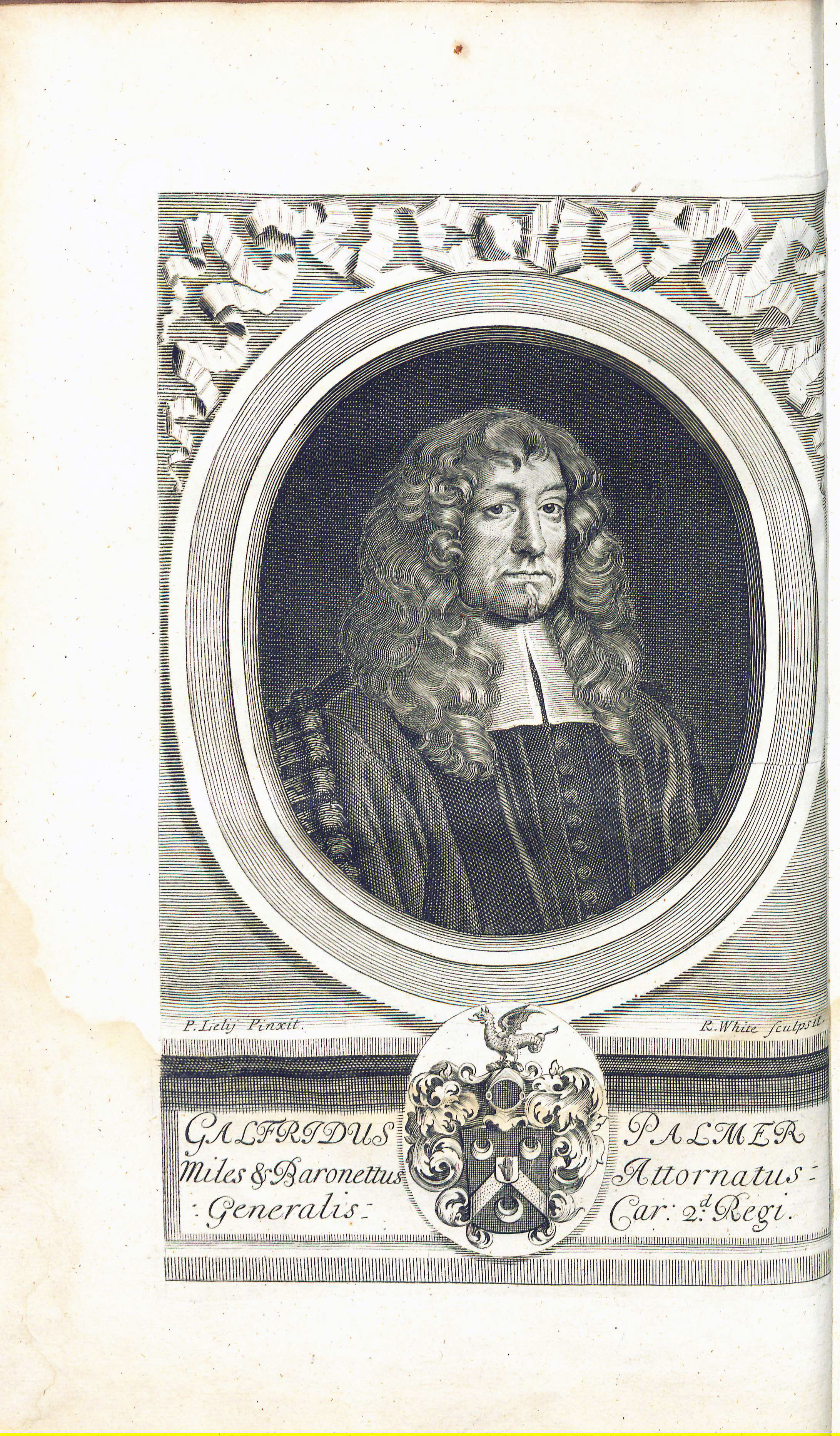Difference between revisions of "Reports de Sir Gefrey Palmer"
(→by Sir Gefrey Palmer) |
|||
| Line 16: | Line 16: | ||
|pages=2, 567 (i.e. 559), [43] | |pages=2, 567 (i.e. 559), [43] | ||
|desc=Folio (32 cm.) | |desc=Folio (32 cm.) | ||
| − | }}[[File:PalmerReportsDeSirGeofreyPalmer1678Frontispiece.jpg|left|thumb|250px|<center>Frontispiece.</center>]]Sir Geoffrey Palmer (1598-1670) entered the Middle Temple in 1616 and was called to the bar in 1623. After an early career in conveyancing, Palmer was elected to the Long Parliament in 1640 but withdrew in 1642 following the vote authorizing the militia ordinance.<ref>Louis A. Knafla, [http://www.oxforddnb.com/view/article/21182 "Palmer, Sir Geoffrey, first baronet (1598–1670)"], in ''Oxford Dictionary of National Biography'' (Oxford University Press, 2004-), accessed 30 | + | }}[[File:PalmerReportsDeSirGeofreyPalmer1678Frontispiece.jpg|left|thumb|250px|<center>Frontispiece.</center>]]Sir Geoffrey Palmer (1598-1670) entered the Middle Temple in 1616 and was called to the bar in 1623. After an early career in conveyancing, Palmer was elected to the Long Parliament in 1640 but withdrew in 1642 following the vote authorizing the militia ordinance.<ref>Louis A. Knafla, [http://www.oxforddnb.com/view/article/21182 "Palmer, Sir Geoffrey, first baronet (1598–1670)"], in ''Oxford Dictionary of National Biography'' (Oxford University Press, 2004-), accessed September 30, 2013.</ref> A member of the royalist parliament in 1644, he was appointed solicitor-general in 1645. A Royalist, Palmer managed to practice law in London during the 1650's and, after the Restoration, became the first attorney-general to Charles II. In 1660, he was also elected bencher of the Middle Temple.<ref>Ibid.</ref> In 1663 he edited the reports of his father-in-law, Sir Francis Moore.<br /> |
<br /> | <br /> | ||
His own case reports, ''Les Reports de Sir Gefrey Palmer, Chevalier et Baronet'', gathered and edited in his earlier career as an attorney, were published posthumously by his son in 1678. Palmer's ''Reports'' includes cases primarily from the King's Bench from 1619 to 1629. "This work set a new standard for law reports as it named the barristers and judges for each statement made. Whether Palmer did more than edit them is doubtful."<ref>Ibid.</ref> Considered to be "of respectable authority"<ref>John William Wallace, ''The Reporters, Arranged and Characterized with Incidental Remarks'', 4th ed., rev. and enl. (Boston: Soule and Bugbee, 1882), 254-255.</ref> but "the learning to be found in the volume, is in a great degree obsolete."<ref>J. G. Marvin, ''Legal Bibliography or a Thesaurus of American, English, Irish, and Scotch Law Books'' (Philadelphia: T. & J. W. Johnson, Law Booksellers, 1847), 552.</ref> Only one edition was printed but it "bears the different dates of 1678, 1688, and 1721."<ref>Wallace, ''The Reporters'', 255.</ref> | His own case reports, ''Les Reports de Sir Gefrey Palmer, Chevalier et Baronet'', gathered and edited in his earlier career as an attorney, were published posthumously by his son in 1678. Palmer's ''Reports'' includes cases primarily from the King's Bench from 1619 to 1629. "This work set a new standard for law reports as it named the barristers and judges for each statement made. Whether Palmer did more than edit them is doubtful."<ref>Ibid.</ref> Considered to be "of respectable authority"<ref>John William Wallace, ''The Reporters, Arranged and Characterized with Incidental Remarks'', 4th ed., rev. and enl. (Boston: Soule and Bugbee, 1882), 254-255.</ref> but "the learning to be found in the volume, is in a great degree obsolete."<ref>J. G. Marvin, ''Legal Bibliography or a Thesaurus of American, English, Irish, and Scotch Law Books'' (Philadelphia: T. & J. W. Johnson, Law Booksellers, 1847), 552.</ref> Only one edition was printed but it "bears the different dates of 1678, 1688, and 1721."<ref>Wallace, ''The Reporters'', 255.</ref> | ||
Revision as of 11:42, 13 February 2014
Les Reports de Sir Gefrey Palmer, Chevalier & Baronet ...: Imprime & Publie per l'Original
by Sir Gefrey Palmer
| Les Reports de Sir Gefrey Palmer | |
|
Title page from Les Reports de Sir Gefrey Palmer, George Wythe Collection, Wolf Law Library, College of William & Mary. | |
| Author | Sir Gefrey Palmer |
| Published | London: Printed by the assigns of R. and E. Atkyns, for Robert Pawlet |
| Date | 1678 |
| Edition | First |
| Language | French |
| Pages | 2, 567 (i.e. 559), [43] |
| Desc. | Folio (32 cm.) |
His own case reports, Les Reports de Sir Gefrey Palmer, Chevalier et Baronet, gathered and edited in his earlier career as an attorney, were published posthumously by his son in 1678. Palmer's Reports includes cases primarily from the King's Bench from 1619 to 1629. "This work set a new standard for law reports as it named the barristers and judges for each statement made. Whether Palmer did more than edit them is doubtful."[3] Considered to be "of respectable authority"[4] but "the learning to be found in the volume, is in a great degree obsolete."[5] Only one edition was printed but it "bears the different dates of 1678, 1688, and 1721."[6]
Evidence for Inclusion in Wythe's Library
Brown's Bibliography[7] includes the 1688 edition of Palmer's Reports based on quotations in the manuscript copy of John Marshall's law notes. The Wolf Law Library followed Brown's suggestion and purchased a copy of the 1688 edition.
Description of the Wolf Law Library's copy
Bound in full old calf, blind tooled ruling, rehinged. Title in old hand on fore-edge. Previous owner's signature on title page. Purchased from Krown & Spellman, Booksellers.
View this book in William & Mary's online catalog.
References
- ↑ Louis A. Knafla, "Palmer, Sir Geoffrey, first baronet (1598–1670)", in Oxford Dictionary of National Biography (Oxford University Press, 2004-), accessed September 30, 2013.
- ↑ Ibid.
- ↑ Ibid.
- ↑ John William Wallace, The Reporters, Arranged and Characterized with Incidental Remarks, 4th ed., rev. and enl. (Boston: Soule and Bugbee, 1882), 254-255.
- ↑ J. G. Marvin, Legal Bibliography or a Thesaurus of American, English, Irish, and Scotch Law Books (Philadelphia: T. & J. W. Johnson, Law Booksellers, 1847), 552.
- ↑ Wallace, The Reporters, 255.
- ↑ Bennie Brown, "The Library of George Wythe of Williamsburg and Richmond," (unpublished manuscript, May, 2012) Microsoft Word file. Earlier edition available at: https://digitalarchive.wm.edu/handle/10288/13433

